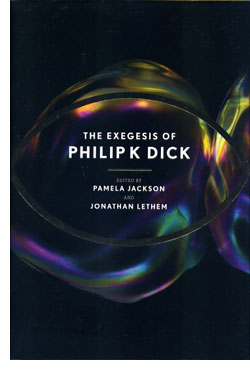 |
 |
 Philip K. Dick
Philip K. Dick
Edited by:
Jonathan Lethem and Pamela Jackson
The Exegesis of Philip K. Dick
Reviewed by: Rick Kleffel © 2011
Houghton Mifflin Harcourt
US Hardcover First Edition
ISBN 978-0-547-54925-5
Publication Date: 11-07-2011
976 Pages ; $40.00
Date Reviewed: 12-27-2011
Index:
Non-Fiction
General Fiction
Science Fiction
Fantasy
We all live with the voices in our head. What we hear, what we listen to and what we say back to those voices helps us define for ourselves, who we are. The back-chatter narrative never stops, even at those times when we might wish it to. At night, awake, we tell ourselves the stories of our lives and if we are lucky, those stories let us sleep.
Philip K. Dick was brilliant, self-taught and deeply troubled. His voices would not let him be, and would not let him sleep; they demanded more. They asked to be written, to be hand-written, typed, to be recorded onto paper as the innate writer who knew his audience was to be but himself. Crafting novels architected on the joys and nightmares of the twentieth century at a pace so fast that he knew his work could not be sold with the serious intent that went into its creation, Dick's agile mind craved more. To speak and be heard, if by none other than itself.
I'll save you the trouble of looking it up; it's an analysis of texts, particularly religious texts. 'The Exegesis of Philip K. Dick' is probably the most important American religious document to come out of the last century. Science fiction and religion have always been intricately intertwined, each seeking the infinite in the human and the place of the human in the infinite. They are quite wary of one another, with good reason. It is easy for perversion of purpose to creep in. There is no perversion of purpose in this book; this is a book of purity. That does not mean it's simple. 'The Exegesis of Philip K. Dick' offers an in-depth look at our world through the eyes of a remarkably imaginative and intuitive individual who sought to see beneath every surface, to the heart of things. His own troubled heart informed his visionary writing.
Collected, edited and trimmed, annotated and assembled by Pamela Jackson and Jonathan Lethem, 'The Exegesis of Philip K. Dick' is a remarkable document and a brilliantly put-together book. Pamela Jackson wrote the dissertation the kicked off the study of Dick's exegesis, "The World Philip K. Dick Made." Jonathan Lethem curated the recent Library of America collections of Dick's best novels. Together, they've gone through mountains of writing, typewritten, handwritten, and even some drawings to put together a remarkably cohesive work. Of course, cohesive is a relative term. The writings are presented in chronological order. You might suss out a bit of a novel here, or a bit of autobiography there. But you will never forget for a second that you are reading the words of Philip K. Dick; not will you ever doubt the peculiarly pertinent perceptions he transcribed of our troubled past.
'The Exegesis of Philip K. Dick' is not a book that you really could read cover-to-cover, and it could be argued that you could never really read it at all. Every sentence rewrites its own reality as well as yours; every insight annihilates the eyes that perceive it. If, and I do believe this to be the case, 'The Exegesis of Philip K. Dick' is a truly religious document, then it is also a transformative document. First and foremost, it transforms itself, as Dick dives deeper into a worldview informed by his own altered perceptions. You can choose your change agent; mental illness, drugs, or the school of hard knocks. Dick experienced them all at a level of intensity we can clearly see in these pages. Whether he is describing humanoid aliens or biological machines, the intricacies of literary presentation or the ecstasies of religious exaltation, Dick writes with a seriousness and a sublime aplomb no matter how odd the messages he's receiving and transmitting may be.
How then to read this; why, then to buy this? Imagine the Holy Bible, hot off the press. A collection of writings old and new, from disputed sources purporting to be the wisdom of no less than an omnipotent God, but steeped in bloody family feuds and self-contradictory visions. Dick himself was steeped in Christianity, and you'll find all cults and references and blessing from Jesus in a manner that may disturb and upset those who admire his science fiction. To a degree, this is a book that is best left on your bedstand, or on the table next to your reading chair. I let myself be immersed at random, compelled by this powerful voice from a powerless man. You must buy because you must read, and this must be read in a book, in the manner of the 20th century in which it was born. The publishers have done a wonderful job at making this a readable, durable testament, and are to be commended.
You are living this moment with the voices in your head. They whisper, scream, promise, lie, cajole and draft every moment of the life you will live. Immersing yourself in the voices heard by Philip K. Dick is exactly what you would expect it to be. Weird, disorienting, exciting, confounding, creative, profound, inane, insightful. A revelation.
|
 |
|
|
 |
| |
Review Archive
All Reviews alphabetized by author.
General Fiction
Non-Genre, general fiction and literature.
Horror
Supernatural fiction, supernatural horror and non-supernatural horror.
Science Fiction
Science fiction, science fantasy, speculative fiction, alternate history.
Fantasy
Fantasy, surrealism and magic realism.
Mystery
Crime, thrillers, mystery, suspense.
Non-Fiction
Non-Fiction, True Crime, Forteana, Reference.
Poetry
|
|
 |
|




